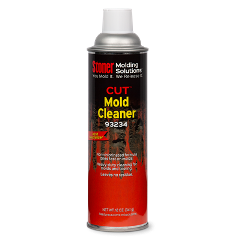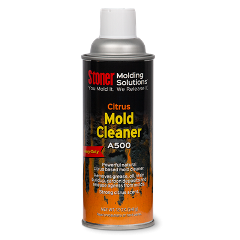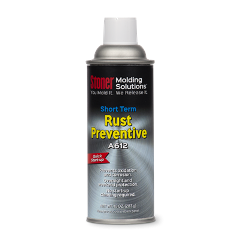5 Frequently Asked Questions about Injection Mold Cleaning Procedures

When you have a complex injection mold that costs hundreds of thousands of dollars, you want to get the most use from it for as long as possible. So, your industrial molding team needs to establish proper mold maintenance and cleaning procedures. Without this, the quality of your finished products will deteriorate, leaving you with scrap parts and excess downtime to clean the mold.
While there is not one specific injection mold cleaning procedure that is right for every operation, there are some things you can do to ensure your molds perform at their best. First, establish a routine mold care procedure, then use only the best mold care products from Stoner Molding Solutions. Don't neglect rust prevention, and change the culture in your industrial molding operations to encourage routine cleaning.
Need more help with your company's preventative maintenance plan? Stoner Molding Solutions has the answers to your top five questions about injection mold cleaning. We've been a leader in mold solutions for 80 years and provide high-quality products to help molders of various industries release more products in less time.
Stoner Molding Solutions has everything from injection mold cleaners to composite mold release agents. Get in touch with our team of experts today for personalized help with your molding operations.
1. What Is Mold Maintenance?
Mold maintenance is the process by which industrial molders clean and inspect the tools used for injection molding. It occurs after a set number of cycles to extend the working life of the mold and ensure it continues to produce high-quality parts. Injection mold maintenance should be a routine and worked into the molding process.
Mold maintenance can also refer to the work performed on molds when issues develop. However, with routine preventative maintenance, your tooling should suffer fewer issues, thus saving you costly downtime.
2. Why Is Mold Maintenance Important?
Mold maintenance is crucial because it removes contamination that can affect the appearance of the finished molded part. Residual material left in the plastic injection molds, rust, cracks in the mold, and other mold damage can result in rejected parts that have now cost your business money and time.
With regular maintenance that occurs right before you start to see the diminished part quality, you can prevent these common frustrations within your operations. Waiting to do maintenance only when problems arise or mold tooling breaks down can require more expensive repairs and jeopardize your productivity.
It's important to note that routine mold maintenance is essential for any molding operations—from plastic extrusion and polyurethane molding to composite and flexible rubber molding operations. And Stoner Molding Solutions provides products for several industries, including composite molding releases, injection mold cleaners, water- and solvent-based release agents, and more. Contact our team today for expert advice for your molding operations.
3. How Do You Clean Injection Molds?
You need to develop a defined cleaning process after determining your mold-maintenance sweet spot—the point before you would typically see mold performance deteriorate. Documentation of the process is necessary to ensure no skipped steps, that new employees have a reference guide, and quality control. Your documented process should contain:
- The specific mold products to use
- The cleaning procedures for each mold
- How frequently your staff needs to clean the mold
- A quality check before returning the mold to production
Your operation's specific mold cleaning method will vary depending on the raw material used, the production environment, product type, and production volumes. General injection mold cleaning procedures should:
 Clean the Mold Surface—Use a powerful cleaner, like Stoner Molding's CUT Mold Cleaner.
This cleaner quickly evaporates and dries fast, leaving no residue on the molding surface. The aerosol spray gets into the nooks and crannies of the mold and won't leave marks. It's a handy product to keep close to the machine to allow operators
to spot-clean the tool.
Clean the Mold Surface—Use a powerful cleaner, like Stoner Molding's CUT Mold Cleaner.
This cleaner quickly evaporates and dries fast, leaving no residue on the molding surface. The aerosol spray gets into the nooks and crannies of the mold and won't leave marks. It's a handy product to keep close to the machine to allow operators
to spot-clean the tool. Inspect and Clean Other Parts of the Mold—Contaminants on the runners sprues, and ejector pins can also affect the part
quality and productivity measures. Examine each part of the tooling and clean using the same cleaner you used for the mold surface.
Inspect and Clean Other Parts of the Mold—Contaminants on the runners sprues, and ejector pins can also affect the part
quality and productivity measures. Examine each part of the tooling and clean using the same cleaner you used for the mold surface.- Ensure the Mold is Dry—The mold will quickly dry if you use a quickly-evaporating cleaner like Stoner's CUT Mold Cleaner. However, suppose you prefer a slower-evaporating cleaner, like Stoner's Citrus Cleaner for Molds. In that case, you'll need to spray it on, let it dissolve the grease, oil, dirt, adhesives, and other contaminants, wipe it down, then blow dry with compressed air. Don't forget to spray with a quality rust preventative before storing to prevent any corrosion.
- Check the Hardware—Make sure all bolts, screws, plates, and other fasteners on your mold are secure and not worn. Fix any issues before putting the mold back into production.
4. What Are the Four Types of Maintenance We Should Be Doing?
There are four types of maintenance an organization should be doing to ensure the injection mold functions properly: routine maintenance, simple preventative maintenance, inspection maintenance, and general maintenance.
Routine maintenance includes spot cleaning any build-up during the production process, using compressed air to remove unwanted dust from the mold, adding lubrication when needed, and spraying a mold release agent at the appropriate times. Perform routine maintenance daily.
Simple preventative maintenance includes following injection mold cleaning procedures at the established time, visually inspecting all screws, nuts, bolts, and other fasteners, and repairing any minor parts. You should do simple preventative maintenance at the maintenance sweet spot.
Lead operators or quality inspectors perform inspection maintenance at the end of a production run. You need to check the mold for repairs, any missing components or blockages, and bent, worn, or broken ejector pins. Inspection maintenance should happen every 20,000 cycles or nine production shifts.
General maintenance is for when parts break down and trained technicians need to repair them. All mold parts need to be inspected, cleaned, and fixed using approved guidelines, products, and personnel.
5. How Do We Prevent Rust on Our Injection Molds?
 A crucial step that some industrial molders neglect is ensuring rust doesn't develop on your tools. Moisture, extreme temperatures,
pressure, and exposure to oxygen can all lead to corrosion on your injection molds. Rust can prematurely kill a mold, making it a financial burden for your company. To ensure the durability of your molding, it is crucial to apply a high-quality rust preventative spray, regardless of whether you plan to store it overnight or for an extended period of time.
A crucial step that some industrial molders neglect is ensuring rust doesn't develop on your tools. Moisture, extreme temperatures,
pressure, and exposure to oxygen can all lead to corrosion on your injection molds. Rust can prematurely kill a mold, making it a financial burden for your company. To ensure the durability of your molding, it is crucial to apply a high-quality rust preventative spray, regardless of whether you plan to store it overnight or for an extended period of time.
The barrier created by Stoner Molding Solutions' rust preventatives protects the mold from the elements, so there's less cleaning you must do before putting it back into production. Plus, our Short-Term Rust Preventative for a weekend or overnight protection works off during start-up, so you don't need to do a final cleaning before putting the mold into the production line.
For More Information about Injection Mold Cleaning Procedures, Contact Stoner Molding!
When you count on your mold to produce parts that generate millions of dollars in revenue, you want to ensure the mold lasts for as long as possible and performs at its best. Finding ways to decrease downtime and increase productivity can be a challenge for those in the injection molding industry. Establishing routine injection mold cleaning procedures and preventative maintenance helps protect your mold and improves the quality of your finished products.
Whether you do injection molding or some other type, like composites or rubber, Stoner Molding Solutions has the right products for you! Our industry-leading chemists, experts, and engineers are ready to help you find just the right injection mold cleaners, composite mold release agents, food-grade lubricants, and more to improve your molding operations. Have additional questions? Contact our team today for assistance or to get personalized recommendations for your business.
